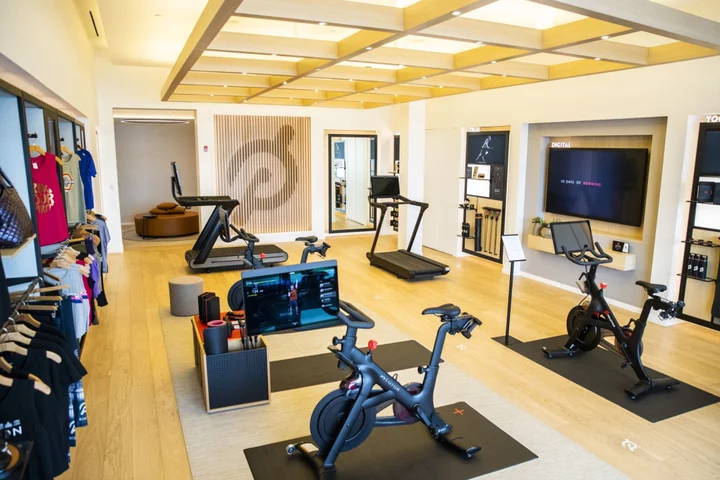
MEDIA ALERT: Want to Reach Gen Z? Matter to Host Free Webinar Revealing the New Rules of Consumer PR
BOSTON--(BUSINESS WIRE)--Aug 23, 2023--
2023-08-23 20:42

Until noon ET today, you can get a Kindle Scribe for 18% off
Save $75: Until noon ET on Aug. 23, the Kindle Scribe (64GB, with a Premium
2023-08-23 20:35

4 hacks to get teens off the sofa and get active – as study warns of heart damage
The amount of screen time teenagers get is a worry to lots of parents. And, it turns out, the health impacts of being inside and staring at a screen for long periods of time as a young person can have serious impact on physical health further down the line. According to new research, parents should limit the amount of time children spend on social media and video games, after a study found inactive teenagers are more likely to have signs of heart damage as young adults. A child may appear ‘healthy’ but, even children who have a normal weight were still at risk, the study of 766 British youngsters found, after tracking them for 13 years. Academics involved in the research, which is to be published at the ESC Congress in Amsterdam, said that this heart damage could be setting the stage for heart attacks and strokes in later life. So, how can we get teens up and out? 1. Encourage them to destress Teens may take to their screens to distract themselves from day-to-day life, watch TikToks, or aimlessly scroll – which they may see this as a form of relaxation. It might be helpful to frame exercise in the same way for stressed teens. “Young people today are facing many stress factors in their daily lives and exercise can be an important mechanism to cope and overcome such difficulties,” says Dr Triveni Joshi, consultant child and adolescent psychiatrist for Cygnet Health Care. Reiterate the benefits of exercise for their mental wellbeing too. “When you exercise, your body produces dopamine and endorphins in your brain that help you to feel good. Exercise can have a direct impact on improving mental health by reducing anxiety, depression and low mood,” she says. “Plus, exercise can give you a real sense of accomplishment and pride at having achieved a goal, thereby improving self-esteem and confidence.” Celebrate the accomplishment of just getting out and being healthy for positive reinforcement. 2. Suggest things that interest them “There is always an activity which can suit somebody,” says Joshi.”There is a range of opportunities for physical activity such as gardening, walking groups, Zumba, dancing, pilates, or swimming.” Sports like weightlifting and running are big on social media and “can improve confidence levels and tackle low self-esteem.” While being on social media may stop them from getting out, pointing towards creators who promote a healthier lifestyle may help them in the long run. Perhaps they can pair their on-screen interests and favourite creators with physical experiences. “Exercise should always be fun so often it is about finding where their interests lie and incorporating that into a healthy regime,” Joshi explains.3. Talk to them about why they don’t want to exercise There may be a reason why your teen isn’t eager to get up and about you don’t know about, and having an open discussion may help them feel more comfortable, and build a closer bond with you. “With other pressures in their lives they may feel tired and lack the motivation to get active,” Joshi says. “A lot can depend on personality type too. Introverted children may feel shy, embarrassed, or too concerned about judgements to take part in physical activity. It might not pique their interest or they may feel it is something they aren’t skilful at and therefore don’t have the motivation for fear of not being good at something.” Getting to the bottom of why they won’t exercise may help them feel more empowered to do so, particularly if you can relate to one another and take on this challenge together.4. Set a good example So much of our relationship with exercise is rooted in our childhood, so try to “encourage children to be active by setting the right example and being active yourself”, says Joshi. If you complain about exercise and are on your screen all the time, it sends the message that it’s normal. In trying to set a good example, you may find something you love to do together, like a specific yoga class, workout or weekly ParkRun. Read More Charity boss speaks out over ‘traumatic’ encounter with royal aide Ukraine war’s heaviest fight rages in east - follow live What we know so far about Naomi Campbell’s Pretty Little Thing collection Taking adult education classes may lower risk of dementia, study suggests Indiyah Polack: I didn’t want to go on Love Island because of my acne
2023-08-23 20:13

Yerbaé the Plant-Based Energy Company Joins Forces With Collective and Richmond Flowers
SCOTTSDALE, Ariz.--(BUSINESS WIRE)--Aug 23, 2023--
2023-08-23 20:07

Elevate Your Workspace – CORSAIR Announces Platform:6 Modular Computer Desk
COLOGNE, Germany--(BUSINESS WIRE)--Aug 23, 2023--
2023-08-23 19:40

Peloton Gives Downbeat Forecast as Comeback Remains Elusive
Peloton Interactive Inc. gave a weak revenue forecast for the current quarter, signaling that a turnaround effort under
2023-08-23 19:20

When is 'Barbie' streaming? Here's how to watch it at home.
Few people haven't seen Greta Gerwig's Barbie yet, or at least it seems that way
2023-08-23 19:18

Missed the back-to-school tax holiday? You still have time in these three states
If you're rushing to complete this year's back-to-school shopping, there's still time to save on sales taxes on those purchases in three states.
2023-08-23 19:13

'And Just Like That...', we're getting a third season
How to encompass And Just Like That...? The Sex and the City reboot has been
2023-08-23 18:05

How to watch India's bold moon landing attempt
India is about to make a bold attempt to land on the moon with its
2023-08-23 17:58

Ford CEO Jim Farley and his $300,000 Mustang are Gunning for Porsche
When Ford Motor Co. debuted its $300,000 Mustang GTD in Carmel, California, Chief Executive Officer Jim Farley wasn’t
2023-08-23 17:35

Taking adult education classes may lower risk of dementia, study suggests
Taking an adult education class could help lower your risk of developing dementia, researchers have found. Middle-aged and senior citizens in adult education have a 19% reduced chance of developing the condition within five years, a new study suggests. The findings also suggest that people who took the classes kept up their fluid intelligence – the ability to reason quickly and to think abstractly – and non-verbal reasoning performance better than peers who did not. First author Dr Hikaru Takeuchi, of Tohoku University in Sendai, Japan, said: “Here we show that people who take adult education classes have a lower risk of developing dementia five years later. “Adult education is likewise associated with better preservation of non-verbal reasoning with increasing age.” Here we show that people who take adult education classes have a lower risk of developing dementia five years later Dr Hikaru Takeuchi, Tohoku University Dr Takeuchi and his co-author Dr Ryuta Kawashima, also a professor at the Institute of Development, Ageing and Cancer at the university, analysed data from 282,421 people in the UK Biobank, which holds genetic, health, and medical information from approximately half a million British volunteers, They had enrolled between 2006 and 2010, when they were between 40 and 69, and had been followed up for an average of seven years at the time of the new study. Based on their DNA, people were given an individual predictive risk score for dementia, and self-reported if they took any adult education classes, without specifying the frequency, subject, or academic level. The study looked at data from the enrolment visit and third assessment visit, between 2014 and 2018. Those enrolled in the study were given psychological and cognitive tests, for example for fluid intelligence, visuospatial memory and reaction time. According to the study published in Frontiers in Aging Neuroscience, 1.1% of people in the sample developed dementia over the course of the study. It also found that people who were taking part in adult education, at enrolment had 19% lower risk of developing dementia than participants who did not. The results were similar when people with a history of diabetes, high cholesterol, cardiovascular diseases, cancer or mental illness were excluded. The researchers suggest this means the observed lower risk was not exclusively due to people with developing dementia being prevented from following adult education by symptoms of these known conditions. Dr Kawashima said: “One possibility is that engaging in intellectual activities has positive results on the nervous system, which in turn may prevent dementia. “But ours is an observational longitudinal study, so if a direct causal relationship exists between adult education and a lower risk of dementia, it could be in either direction.” Read More Charity boss speaks out over ‘traumatic’ encounter with royal aide Ukraine war’s heaviest fight rages in east - follow live Indiyah Polack: I didn’t want to go on Love Island because of my acne Everything you need to know about the UK’s first womb transplant Why are wellbeing experts concerned about the ‘lazy girl job’ trend?
2023-08-23 17:28
You Might Like...

Apple Watch Series 9 'Double Tap' is hot, but these 5 features are flaming

Evenepoel's Giro team shredded by new positive Covid cases

Lost in the metro? Paris translation app aims to help visitors

Save 80% on a one-time shipment of 18 bottles of wine

Paris Fashion Week calendar confirmed – with a major surprise and notable absentees

The most fascinating star in our sky inches closer to exploding

OpenAI calling for AI regulation is a solid step in no direction

Score an exclusive 60% off on the Amazon Fire TV 50-inch Omni Series with this invite-only deal
